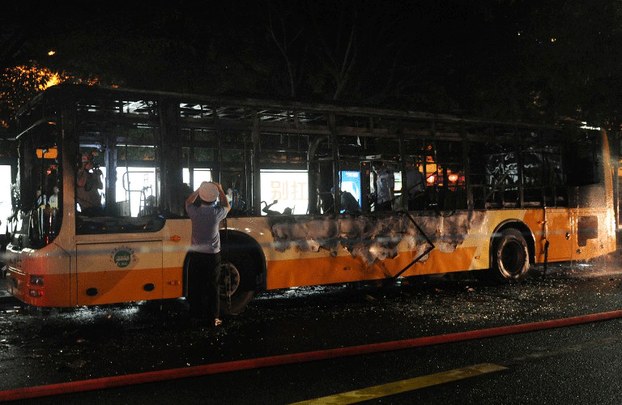




China's Ministry of Public Security has ordered operators of subways, buses and other transport networks nationwide to post security guards on all public transport in the wake of a fatal bus fire in the southern province of Guangdong.
"Security staff should be present on every subway train and every bus with necessary protection and safety gear," the ministry ordered in a circular issued after an emergency meeting on July 16.
"Police forces should work with transport authorities to manage security and the public should be mobilized," official media quoted vice public security minister Huang Ming as saying.
Measures should be taken to prevent further violent crime on public transportation services, especially arson and home-made bomb blasts.
Police should also intensify patrols, and reinforce management and monitoring of dangerous items and people, the directive said.
Security personnel must also be trained to identify illegal objects and organize emergency evacuations, it said.
Guangzhou police on Wednesday said they had detained a man in connection with a suspected arson attack that left two people dead and 32 injured in a huge fire on the Route 301 bus in the city a day earlier.
A 25-year-old man surnamed Ou was detained in Guangzhou's Baiyun district at 11:47 am, roughly 16 hours after they said he caused the city's No 301 bus to explode.
Official media say Ou has admitted to starting the fire with explosive materials carried in a large gym bag, which he then ignited, Beijing's New Express newspaper reported.
Ou told police he had started the fire out of frustration at his gambling debts, it said.
The majority of those injured in the fire had severe burns, and were transferred to the Guangdong Provincial People's Hospital on Wednesday.
'Stability maintenance'
The new directive is the latest in a string of "stability maintenance" measures across China, which range from pre-emptive checks on ethnic minority Uyghurs and Tibetans to squads of citizen volunteers patrolling the streets looking for evidence of terrorist-related activity.
Xinjiang authorities declared a one-year crackdown on "violent terrorist activities" following the May 22 bombing at a market in the regional capital Urumqi that killed 43 people, including the four attackers.
But public acts of violence are longstanding problem in China, whether or not they are designated "terrorism" by the authorities.
Activists say a series of blasts and fires in public places in China in recent months are symptomatic of deep social tensions and injustice that have no immediate solution.
On July 5, a bus in the eastern city of Hangzhou was destroyed in a fire that injured 32 people, many of them critically, in what police said was "not a terrorist attack."
And in March, a man accused of starting a bus fire in the southern city of Guiyang that killed six people reportedly said he was taking "revenge on society" when he lit up a barrel of gasoline on the vehicle, causing it to burst into flames.
Last October, authorities in Beijing handed down a six-year jail term to a man crippled in an act of police brutality who set off an explosion at the city's international airport after the authorities refused him compensation.
Chinese authorities have kept up a "stranglehold" on petitioners and rights activists in recent years, subjecting thousands to arbitrary detention in labor camps and unofficial "black jails," rights groups say.
Public policy analyst Yang Zili said more security clearly isn't solving the problem.
"Things are only going to get worse, unless we focus our attention on solving the conflicts [that lead to these acts]," Yang said.
"Our society is unjust, whether in the area of education or the legal system, and there is nothing we can do when our rights are violated," he said.
"There are people who use their death as a form of protest, while others want to be revenged on society."
'Ridiculous'
Retired Beijing University of Science and Technology professor Chen Zhaozhi said the idea of security personnel on all of public transport was "ridiculous."
"The other day I was traveling on Route No. 44 in Beijing and there was a security guard there...and I asked him if he would be able to stop someone from starting a fire, and he said he wouldn't know who was doing it," Chen said. "Even they think it's pretty pointless."
"People only do these things when they've been forced into a highly distressed state," he said. "Why don't we look at why they're getting into this state, and perhaps solve the problem of public anger over official corruption while we're about it?"
"It's pointless to terrorize people further with all this security."
Reported by Xin Lin for RFA's Mandarin Service. Translated and written in English by Luisetta Mudie.